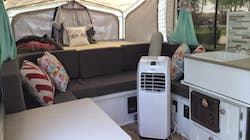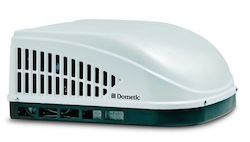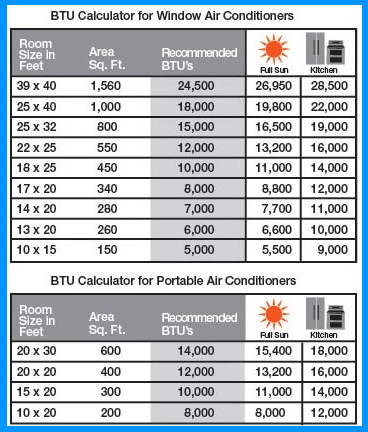Thanks for your support! If you make a purchase using our links in this article, we may make a commission. And, as an Amazon Associate, I earn from qualifying purchases. See the full disclosure here.
Updated 3/29/24
Susan of RVBlogger owned a pop-up camper for over 10 years. While her daughters were growing up, she used to take them camping on most weekends every spring, summer, and fall.
The one thing she wished she had in her pop-up camper was air conditioning. That comment made me wonder—does A/C actually work in a popup camper? I was surprised to learn that the answer is yes!
Of course, before you decide to add A/C to your popup camper, it is important to understand your needs so you can find the right A/C unit. In this article, we will discuss the three types of air conditioners for pop-up campers.
We will also discuss how to determine the size of the A/C unit you need to cool your pop-up properly. In addition, we will provide examples of the cost of popular A/C units and finally, we will offer some tips for keeping your pop-up cool.
What Type of A/C Do You Need in a Popup Camper?
There are three types of air conditioners that work in a popup camper trailer. Portable A/C units, Window units, and Rooftop units. We will discuss the advantages and disadvantages of all three types below so you can determine which type will work best for you.
Portable A/C Units

Portable A/C Units for RVs are the newest of the three types of A/C Units. They are typically on wheels and they can be placed anywhere you want in your pop-up camper. They vary in size, but they often resemble a tall dehumidifier and they also have fans to keep the air moving inside the pop-up camper.
Advantages:
Portable air conditioners are very easy to use, and they require little effort from you in order to have cool air. Their main benefits are that they are inexpensive, they are small and lightweight and you can move them around. Older units were not very strong but there are units on the market now that go up to 12,500 BTU’s and cost under $500.
Disadvantages:
The biggest disadvantage with a Portable A/C Unit is that it needs to be placed near a window because they use one or two vent lines that transfer the hot air from the device to the outside. They do come with an adjustable frame that is placed below a window to keep the hoses in place but the unit needs to be placed close to a window. And of course, they take up precious floor space inside your pop-up.
Although Portable air conditioners are relatively cheap some Rvers complain that these types of units are loud since the compressor of the air conditioner is inside the camper. So you will hear the cooling sound while inside your pop up.
Window Mounted A/C Units

Another type of portable air conditioning unit is the Window-Mounted A/C Unit. They are secured in the window of the pop-up trailer, and they are very easy to install, so you can easily mount them yourself.
Advantages:
The window-mounted A/C Unit offers outstanding cooling ability and it doesn’t take up space since it’s installed outside of the window. Also, they plug into a standard wall receptacle so they are very easy to set up. In addition, they are easy to mount and the compressor and cooling components are outside the window so although you will hear it, noise won’t be much of a problem.
Disadvantages:
Although they are stronger than the smaller, wheeled portable air conditioning units, they are less powerful than the rooftop models. Also, you will need to remove the unit from the window every time you break camp and travel. This is somewhat of a hassle but the work is very minimal.
Rooftop A/C Units

An RV Rooftop A/C Unit is the most popular of the three options. Rooftop air conditioners resemble a box which is mounted on top of the pop-up trailer. Most rooftop air conditioners are strong enough to efficiently cool your pop-up. A single rooftop air conditioner can cool an area of 10 feet by 20 feet rather easily.
Advantages
There are many advantages to adding a rooftop air conditioner to your pop-up camper. They are efficient and powerful enough to provide cool air inside even during very hot and humid summer weather.
The newer models of rooftop air conditioners are quieter than portable or window mounted A/C units which makes them a great choice for sleeping comfort. And, once they are installed you don’t have to remove them when you travel.
Also, rooftop A/C units are equipped with a thermostat so you can set them to your desired temperature. In addition, many rooftop units can double as a heater which can extend your camping season from early spring to late fall.
Disadvantages
The biggest disadvantages of a rooftop A/C unit are price, installation requirements and energy draw. Rooftop air conditioners can also be costly to repair. The A/C unit itself costs more than the other A/C options and it is much more difficult to install.
You may need to add roof supports in your pop-up trailer to handle the weight of the A/C unit and to ensure proper water runoff from your roof. It’s definitely recommended that you have it professionally installed, which means that you will also incur an added installation expense.
Depending on the size of the unit it can use a ton of power, so this is not the best choice for those who are conserving energy or like to camp off the grid.
What Size A/C Do You Need in a Pop-up Camper?
Before buying an air conditioner you need to know the amount of BTUs needed to cool your pop-up camper. BTU means British Thermal Units, and the higher the BTUs the stronger the air conditioner. The easiest way to find the right number of BTUs for your pop-up camper trailer is by multiplying the square foot area of the trailer by 40.
However, since your pop-up trailer is not insulated you should aim for the high side of the recommended BTUs so you don’t buy an A/C unit that is too weak and can’t cool your RV. Below is a chart to help calculate your BTUs needed to cool the air in your pop-up or RV.

How Much Do A/C Units Cost?
When you are looking for the most suitable air conditioner unit brand for your pop-up camper, the most important figure to look for is the BTUs. Usually, the price of an air conditioner also rises with the BTU number. Below we have provided some examples of costs for all three types of A/C units along with BTUs so you can see how they all compare.
- MIDEA EasyCool 3-in1 Window Air Conditioner with Dehumidifier – 8,000 Btu – $224.00
- BLACK + DECKER 14000 BTU Portable Air Conditioner Unit + 11000 BTU Heater – $384.00
- Dometic Polar White 13,500 BTU Rooftop Air Conditioner only – $601.90
- Advent Air Rooftop RV Air Conditioner w/Vent, Start Capacitor, and Heat Strip – 13,500 Btu – $766.45
- Atwood Air Command Rooftop RV Air Conditioner w Heat Pump – 15,000 Btu – Non-Ducted – $886.00
- Coleman RVP 45203876 MACH 10 13.5 BTU AC White – $900.00
Tips to Maximize A/C in Your Popup Camper
Here are a few tips that will help to keep you cool in your pop-up.
- Try to park in the shade
- Use a fan in addition to the A/C to keep the air moving
- Insulate the inside of your popup
- Keep your A/C unit maintained so it is operating at peak performance
- Clean the A/C filter regularly
- Make sure your popup is level – Check out our article called How To Level a Travel Trailer on a Slope for more info!
Final Thoughts about if A/C Works in a Popup Camper
Air conditioning units for pop-up trailers are not too expensive. They cost anywhere between $200 and $1500 depending on the type and the BTUs. If you are an avid camper then making an investment in a rooftop air conditioner is well worth the money. Otherwise, you can get by spending much less money on a portable or window unit air conditioner.
For more helpful info about Pop-up Campers check out some of our other articles below.
- What You Should Know Before Buying a Popup Camper
- 7 Best Pop Up Campers with Bathrooms
- How Much Does a Pop-Up Camper Weigh?
- How Much Does an A Frame Pop Up Camper Cost?
- 21 Must Have RV Accessories for a New Camper or Travel Trailer
- Average Pop Up Camper Weight – All You Need to Know
Do you have any thoughts or questions about air conditioning your pop-up? Please share any comments or suggestions below.
Thanks for reading this article and if you would like to contact us directly, please feel free to visit our Contact Page to send us an email.
To see a list of all of our articles check out the Blog Archive!


Hiya, I am really glad I’ve found this information. Today bloggers publish only about gossips and internet and this is really irritating. A good website with interesting content, this is what I need. Thank you for keeping this site, I’ll be visiting it. Do you do newsletters? Can not find it.
I have had 3 small motorcycle campers that I pull with my 1800cc Honda Goldwing.
There is an AC flap on the side of the camper that you have to cut out the inter camper wall.
I have used a window 5,000 BTU AC and it has worked great. Please remembr that I am only talking about 60 sq ft of bed and floor space, with a 7 foot roof. It was 98 out side, and when I came back from a boat ride, it was 66 in the camper. The first night, I set the temp up to about 74, and it ran about every 45 minutes for about 10 minutes. it was still 84 when we got up in the morning. I have seen window AC units cut into the area under the slide out beds on a standard pop up camper. (Front and back, with supports added to support the weight of the AC unit.) Some also, on the side walls, but were removable, to lessen the width of the trailer. They use to make a 3,000 BTU AC unit, but I haven’t been able to find one. It would be lighter and big enough to cool my small camper. Camping in Yuma Az, you need AC, if you have electric power.
Well thought out and helpful article. Don’t have a pop up yet. AC important to me here in Florida. What might be the difference in cooling needs between a hard side, like an A frame and a tent sided?
Hi Richard. I was tent camping when I was 2 years old. My Dad always said, “Put your tent in the shade, you can always move to the sun…” I would think the AC in an A frame would not have to work so hard as in a tent side. Remember the tent side will breath better, so hot windy days, the AC would have to work harder. They are also damper at night. I spent many nights in an army tent, and woke up to wet uniforms, until I started to cover them with a tent half, under my cot. We camped for years in tents, and then a pop up camper, with no air, just a fan. But we could go into the lake anytime day or night. My Dad had a colman cooler that he put a bunch of holes in it and added a fan. I think that he called it a swamp cooler. He served in the Army air corps, in Texas. I think that’s where he got the idea. I would think that a 5,000 BTU AC unit would work for both, just run more in a tent side.
Following Kristin’s question. I’m the original owner of a 1983 Coleman Columbia. Air is the only item lacking. Thank you!
Thank you for the great information! This really helped me make my decision. I was torn between a portable unit and a window unit, as our pop-up roof is not strong enough for a roof-mounted unit, and we want the roof space for other things, like hauling our kayaks (with side support for the mounts, of course, not on the top). Thanks again!
I have a 1990 coleman Columbia pop-up camper it small but my son and I need an A.C FOR THOSES BAD DAYS TO come what would you recommend for me to use in our camper?
I have a portable that does not have a drain hose. It only needs to be drained when set on dry (dehumidify) and you can open the plug and empty outside or in a bowl. If the one you have has to be drained constantly, you might be able to rig it to drain into a 2 Liter bottle and just empty it daily.
can you let me know the make and model number. Thanks I have an Aliner
Did you come up with anything?
Great article but I need help figuring out exactly how to install a portable a/c in a pop up since portable’s come with a hose. Do you just stick it out a window? How is that possible since the pop up windows are all covered in a mesh screen?
Have roof top ac don’t like the fact it drains on bed canvas.is there any solution to this don’t like to have wet canvas when ready to put pop up down
Hi Linda,
I don’t know for sure but I have installed many air conditioner condensate lines in residences but never on an RV. But you can probably connect some tubbing to where your A/C condensate line exits your rooftop A/C and run it from there down the side of your pop up. It may require an adapter but you can most likely find everything to do the job at Home Depot. You may have given me an idea for a future article!
Thanks for reading!
Mike
Some people take hollow pool noodle, cut a slit lengthwise then place the noodle where the roof meets the bedend canvas with a bit of pitch overhanging the side a bit. Presto, instant gutter!
We use a hollow pool noodle on the side of our TV in the RV so it doesn’t bang against the wall while we are driving down the road!
A million and one uses for the pool noodles!
Mike
I use reflectix it insulates the camper keeps it cool in the summer and keep the heat in in the fall but it also keeps the bunk ends dry you just have to make sure to tuck them under the roof. I also cut some out for my windows. The difference is night and day
I want to to thank you for this very good read!!
I certainly enjoyed every bit of it. I have got you bookmarked to look at new things you post?
Thanks!
I’m glad you liked the article!
Mike
Choosing what type of AC units to install in your popup campers is depend on the RV owners situation. Although installing Rooftop AC unit is more convenient, you should also consider the advantages of installing Window-Mounted AC and Portable AC as well. Thanks for sharing.
That’s a very good point. Sometimes a window unit makes more sense and they cost less too!
Thanks Ryan
I bought a popup with a roof mounted ac. I was shocked at how well it actually kept it at 68 degrees with no shade on an 85 degree day!
Hey, that’s awesome Joe.
What size pop up and how many BTU’s was the A/C unit?
Mike
I found this blog to be very resourceful and well written.
Hi Ara,
I appreciate the compliment.
Thanks,
Mike